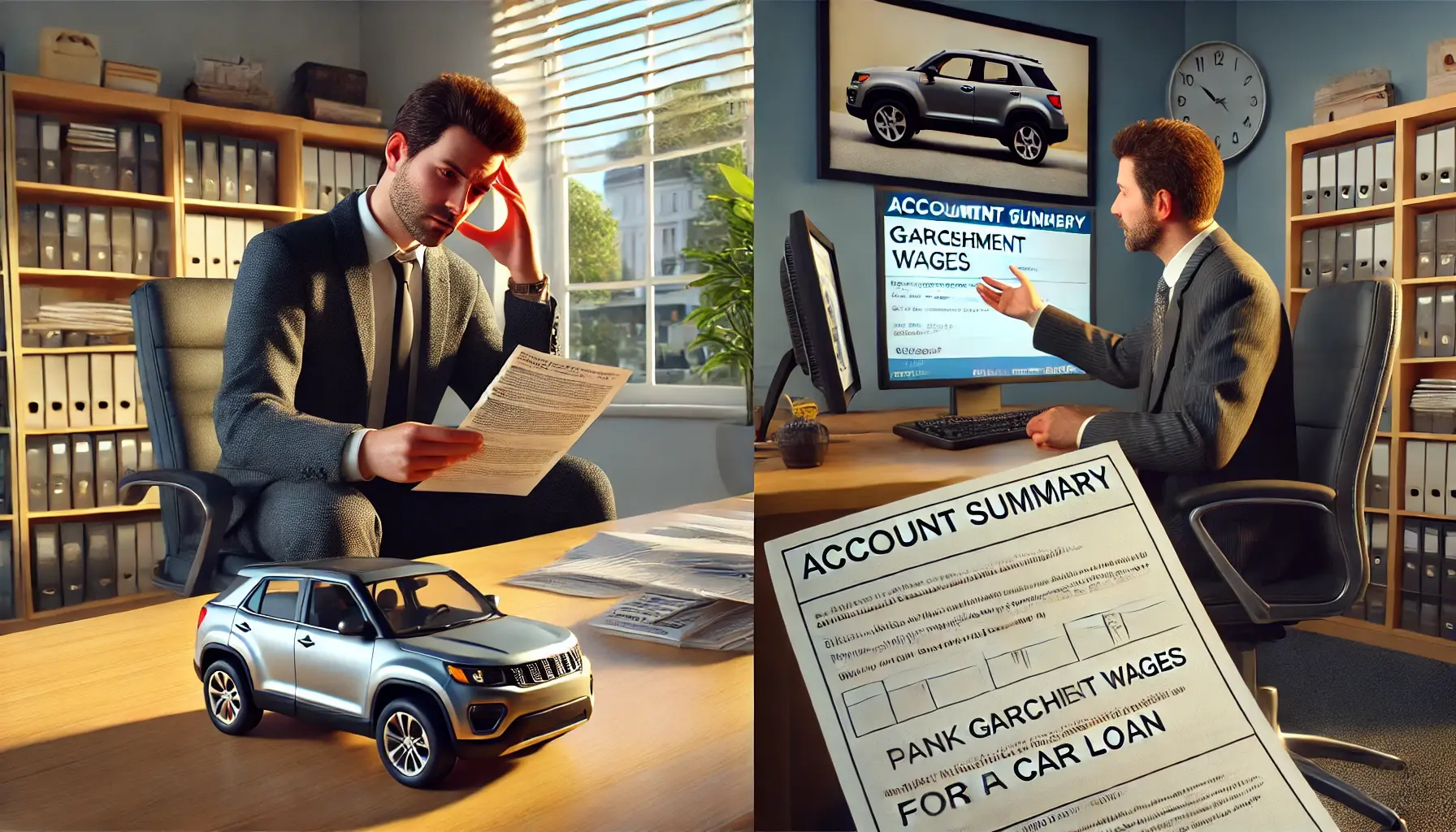Have you ever wondered if a bank can take money directly from your paycheck for an auto loan? It might sound surprising, but the answer is yes. If you owe money on a car loan and fail to repay, the lender may pursue legal action to collect the debt. This is where wage garnishment comes into play. When lenders are trying to garnish your wages for a car loan they often rely on a court order. This allows them to deduct money from your disposable income to settle the debt. Understanding the process and your options to stop the garnishment can help you take control of the situation.
Wage Garnishment
Wage garnishment is a legal process where a creditor can take money directly from your paycheck. It happens when you fail to meet financial obligations like an auto loan, student loan, or child support. A court order usually approves this action, forcing your employer to deduct a portion of your income.
How Does Wage Garnishment Work?
The process begins when a lender, like an auto finance company, files a lawsuit to recover unpaid debts. If they win, the court issues an order allowing them to garnish your wages. The amount deducted depends on your disposable income and certain limits, such as not exceeding 25% of earnings or two times the federal minimum wage, whichever is less. To estimate your repayment capacity and avoid garnishment, you can use a loan calculator to plan your budget effectively.
Can a Loan Company Garnish Wages?
A loan company, like a payday lender, can garnish your wages if you fail to pay back your loan. They usually need to get a court order before taking this step. However, if your car is repossessed, they might still seek wage garnishment to recover the remaining balance on your loan.
Reasons Wages for Car Loans Are Being Garnished
- Wages can be garnished for several reasons, such as unpaid loans, taxes, or child support.
- If you fail to pay off your debt, the court will send instructions to your employer for the deduction.
- In cases of repossession, creditors may pursue garnishment even after they take your car back.
How Much of Your Wages Can Be Garnished?
The amount that can be garnished depends on your income and limits set by law. Creditors cannot garnish more than 25% of your earnings or 30 times the federal minimum wage, whichever is less. Understanding these rules is key to managing your personal finance and protecting your income.

Wage Garnishment for Car Loans
Can a Creditor Garnish My Wages for a Car Loan?
If you owe on the loan for your car and fail to repay, the lender can garnish your wages. This usually happens after you default on the loan agreement. Whether it’s a bank or a credit union, they can use the wage garnishment process to recover the money you owe.
When Can a Lender Issue a Garnishment Order?
A lender can only issue a garnishment order after obtaining a court judgment. State laws may also affect the enforcement of the order. In some cases, you’ll need to work out a payment plan or the lender may sell the car to recover the debt.

How Car Loan Debt Leads to Wage Garnishment?
Dealing with Wage Garnishment
Steps to Stop Wage Garnishment for Car Loan
- If you face garnishment of your wages, there are steps you can take to stop it.
- First, talk to your lender to negotiate a repayment plan.
- You may also need to get a court order to protect your wages that they do not garnish.
- Acting quickly is crucial if you want to avoid further financial strain.
- Making additional principal payments on your car loan can reduce the overall debt and help stop wage garnishment faster. Learn more about additional principal payments.
If Wages Are Garnished for a Monthly Payment, What to Do?
When an auto lender starts garnishing your wages, review your budget to ensure you can afford the payments. If possible, refinance with a new loan to lower your monthly car payments. Make sure to make all payments on time to avoid future issues.
Payday Lender Garnishment for Payday Loan Debt
Financial Impact of Wage Garnishment
Does Wage Garnishment Affect Your Credit Score?
When your wages garnished through a process called wage garnishment, it does not directly lower your credit score. However, missed payments leading to garnishment can harm your credit. It’s important to make at least one monthly payment to reduce the negative impact on your report. While prequalification offers insights into your loan options, it doesn’t guarantee approval. Understand the details about prequalification guarantees.
How Wage Garnishment Works for Minimum Wage Earners
For minimum wage earners, garnishment law protects part of their income. The law considers the number of dependents and exempts income below a specific amount from being garnished. Employers cannot take money directly if earnings are exempt from garnishment under these rules.
Next Step to Do When Money Is Taken Out of My Bank
Legal Aspects of Wage Garnishment for Car Loan
Wage Garnishment Order?
A wage garnishment order allows creditors to use their earnings to pay off debts they owe. They often use this process to recoup their money when they fail to make payments. It’s crucial to understand how much you can afford to pay each month to avoid further financial stress.
How to Get a Garnishment Reversed
To reverse garnishment, you can file a legal motion or prove financial hardship. This step ensures you retain enough income for necessities. Once resolved, you may be able to buy time to restructure payments and manage debt better.
Rights and Protections Against Garnishment of Wage for Car Loan
Prevention and Alternatives to Wages for a Car Loan
How to Avoid Wage Garnishment for Car Loan Debt
You can avoid wage garnishment for car loan debt by staying proactive about payments. Use consumer credit counseling to plan your finances better. This approach helps you make payments on time and ensures creditors won’t take money directly from your paycheck.
Negotiating Payment Plans with a Loan Company
If you face financial difficulties, talk to your lender about a new payment plan. This negotiation can help you get the money you owe over time without harsh penalties. Always aim to manage payments effectively to avoid relying on your paycheck to repay.



